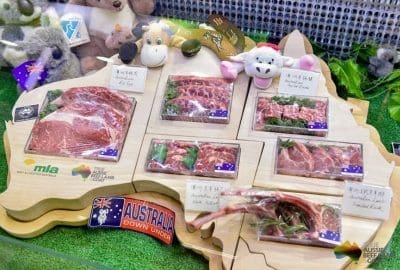CHINESE authorities have pointed the finger at Australian imported beef as the potential source of two positive drug tests recorded against Chinese swimmers two years ago – one of which is competing in Paris this week.
While providing zero evidence, Chinese authorities suggested Australian beef consumed at a food service outlet near the swimmers’ training facility in Beijing was the likely cause.

A display promoting Australian beef and lamb in China.
The New York Times reported the two Chinese swimmers tested positive to trace amounts of the anabolic steroid methandienone in 2022. News of the episode and the accusation over Australian beef as the likely cause only surfaced on Tuesday, sending ripples around the Olympic swimming community gathered this week in Paris.
The Chinese couldn’t prove where the drug came from, even though the Chinese state security agency became involved and tested the source of the meat from Australia “where some cattle are treated with hormonal growth promotants to boost weight.”
The positive drug results, and a subsequent ban imposed on the two Chinese swimmers for just 12 months, was kept secret from the swimming community, and the actions of the World Anti Doping Agency have again been brought in question, The Australian reported yesterday.
Australian metropolitan media carried front page stories on the development this morning, mocking the ‘bizarre’ Chinese claims with headlines like “Hamburglers with lies,” “Playing silly burglers,” “Would you like lies with that?” and “Beefgate.”
WADA and World Aquatics accepted the Chinese explanation that “it was probably contamination from a lunch comprising hamburgers and fries and a soft drink at a restaurant near their training base at the National team facility in Beijing,” and took no further action.
The source of contamination claim has been strenuously denied by the Australian beef industry, with Meat & Livestock Australia issuing a one-line statement this morning saying, “Methandienone is not used in any capacity in Australian beef production or in any veterinary medicine.”
Cattle Australia’s CEO Dr Chris Parker also confirmed that methandienone is not used in any capacity in Australian beef production, and added: “We look forward to continuing to provide China and all our customers with nutritious high quality Australian beef.”
The Department of Agriculture, Fisheries and Forestry was also able to confirm to Beef that Menthandienone is not approved for use in Australian beef production.
“Australia has a robust regulatory system and produces beef to meet importing country requirements,” a Department spokesperson said in a statement.
“Australian beef produced is safe for consumers.”
Methandienone, also known as methandrostenolone, is sold under the brand name Dianabol (D-Bol) among others. It is an androgen and anabolic steroid medication which is often used because of its effectiveness for bulking cycles.
Methandienone has never been detected in Australian beef exports, despite countless residue screening tests in Australia and overseas over the past 30 years.
Veterinarians told Beef Central this morning that methandienone is used legitimately in human medicine around the world, and is a popular drug of choice among human body builders, but was not effective in beef cattle.
“It would make no sense to administer an unregistered compound like methandienone to cattle, when there are other anabolic steroids (testosterone derivatives) like trenbolone acetate (TBA) found in registered cattle growth promotants, which are permitted for use (in markets that accept HGP-treated cattle), are more effective in cattle, easier to obtain, cheaper and produce longer pay-outs,” one experienced cattle vet said.
“The fact it is not particularly effective in livestock is one reason why methandienone it is not registered for cattle,” he said. “Why would anybody bother with something illegal, more expensive and harder to get, if they wished to use growth promotants in a cattle production system?” he asked.
It was unclear if WADA had conducted a wider investigation by asking Australian beef producers about which hormones are given to cattle in the country before accepting the Chinese excuse, The Australian said.
On the eve of the Paris Olympics last week, Australian swimmer Zac Stubblety-Cook said the drug testing system had failed, as athletes had lost confidence in WADA.
While Western swimmers are immediately banned and had to prove – through the no fault strict liability rules as to where the drug may have come from to gain any reprieve – the Chinese only had to yell ‘contamination’ and the issue is swept under the carpet, he said.
Australian beef exported to China is sold under a strict no HGP policy. While a number of Australian beef plants servicing the China market have been suspended over the past five years over regulatory/documentation matters or ‘unusual’ residue detections, none have involved hormonal growth promotants.
